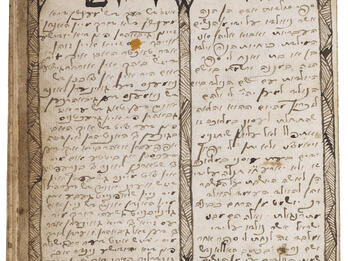Literature and Modernity
Jewish writing in the period spanning 1750–1880 reflects the profound changes that confronted Jews in modernity. Some writers self-consciously broke with traditional and religious models; others definitely embraced it.
Jewish writing in the period spanning 1750–1880 reflects the profound changes that confronted Jews in modernity. Writing during this period includes many genres and styles, both formal and informal, literary and colloquial, across language, gender, class, and profession. Some writers self-consciously broke with traditional and religious models; others definitely embraced it.
The genre of life writing introduces readers to the writing of this period in two ways: first, it allows the reader a glimpse into individual lives as their writers presented them, a way to step into the world of the past as it was recollected by those who lived it. Second, writing about the self emerged as a literary form in this period. While not all life writing is self-consciously literary, each selection opens a small window into the contours of an individual Jewish life.
Similarly, travel writing introduces the notion that the mobility of Jews as individuals as well as in large numbers was a hallmark of this period. Unlike migration for the purpose of settling in a new place, travelers intended to return home with impressions and reports of the marvels they had seen abroad. Their writing allows us to reflect both on their own cultures and on the ones they visited, to see the world through their eyes.
A key concept in the sources from this period collected in the Posen Library is the rise of a Jewish-inflected culture that is not primarily religious. The expansion of belles lettres in many genres in Jewish and in vernacular languages, literature written for its aesthetic rather than primarily utilitarian value, is another new feature in Jewish culture of this period. In folktales, fiction, and poetry, Jews wrote in their local vernaculars, or in Jewish vernaculars; they revived Hebrew as a modern literary language. New forms of writing progressed from the first wooden and stumbling efforts to literary mastery that eventually allowed modern Jewish writers to renew Jewish culture and to secure their place in modern world literature.


